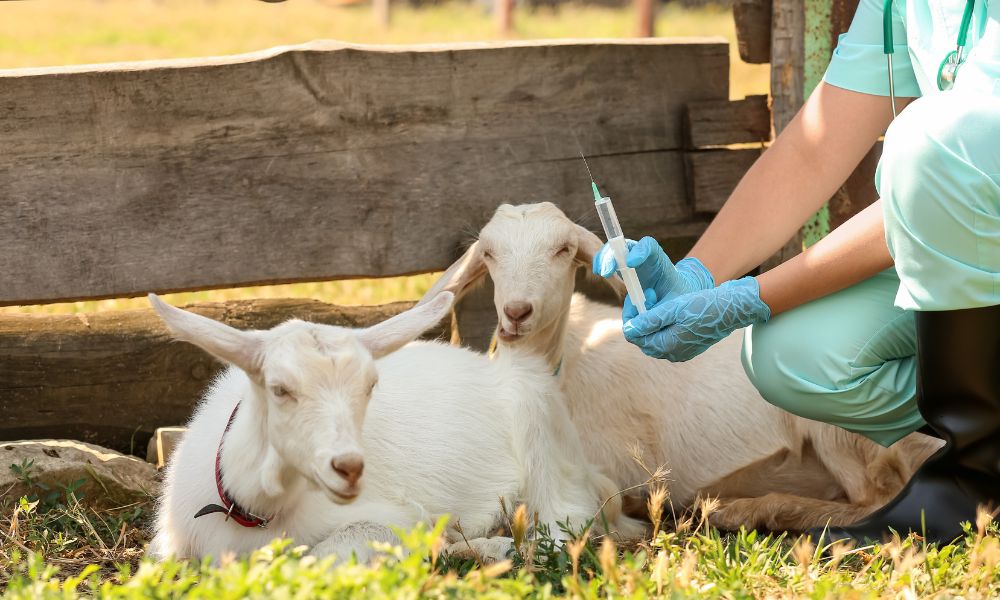How exactly you vaccinate your goats may depend on where in the world you are.
As I say, different products have been developed and are recommended by different veterinary and farming agencies throughout the world.
Let’s look at how vaccines work in goats.

What are vaccines for in goats?
Vaccines in goats serve the same functions as in anything else.
They reduce the risk of becoming severely ill from certain transmissible diseases, as well as reducing the risk of being infected and transmitting it to others.
Goats are susceptible to a number of such diseases which we are not.
Since goats are so widely farmed, many vaccines have been developed over the years to keep them safe from disease and death.
We all want to protect our pets, but you can be sure that farmers want to protect their livestock.
So, vaccines are designed to mitigate severe disease, essentially.
That’s about it.
Which vaccinations, specifically, do your goats need?
What vaccinations do goats need?
The most important vaccinations your goats need are going to be against clostridial disease and tetanus.
While it does vary from region to region, broadly speaking, these are the most commonly problematic conditions for goat keepers.
Both can cause death and disability in goats.
As I said, the most commonly used in many places is called Lambivac and protects against these two conditions and more.
Often, in areas without other endemic diseases, Lambivac is all you will need.
As long as yours are protected from what I’ve mentioned here, you should be mostly fine.
Just, again, check your area for what else goats and livestock are commonly vaccinated against.
How often do goats need these vaccines, then?
How often do goats need vaccines?
Unlike to a human, you don’t need to be a medical professional to legally administer a vaccine to an animal.
Most goat owners like to get the hang of doing it themselves to cut the vet costs, and so the important thing here is to know that you’re doing it frequently enough.
The problem is, though, that it will be different per each vaccine.
You are best off having a written timeline of when they will need the vaccines.
If the kid is from an unvaccinated doe, you need to start vaccinating much earlier, at around two weeks. 10 for vaccinated mothers.
Most primary courses of the vaccine are given in two doses, 4-6 weeks apart.
Then, they will need a booster every six months or so.
For pregnant does, you should try and administer a booster 2-4 weeks before the due date.
Again, this is only a very rough guide.
Depending on the vaccines you’re administering, it will most likely look quite different.
So, how exactly does one vaccinate a goat?
How to vaccinate a goat
Before you vaccinate a goat for the first time, you should really watch someone else do it properly.
The best thing to do is have a vet give the first round of doses, watch them carefully, and then you can cut them out in the next doses.
The most important thing is hygiene and sterilization.
Lumps and abscesses due to dirty needles are very common and can lead to a wide variety of problems.
Clean both the needle and the goat fully.
The needle then really just needs to pierce the skin and muscle.
Again, this is only a basic guide—this will only be of use to you if you have already watched someone vaccinate a goat.
Don’t try and wing it.
How often do goats need CDT shots?
You may hear the term CDT a lot, but this essentially refers to the same, all-in-one vaccine we have already been talking about.
So, depending on the vaccination status of the mother, they will need their first dose at either 2 or 10 weeks.
After that, they will need a second dose 4-6 weeks later.
Six months after they’ve had their second dose, they will then need a booster shot.
Keep up the boosters forever, pretty much, and they will always be protected.
Goats are like any domestic animal, then.
They need vaccines just like our dogs, cats, and our children do.
Indeed, it’s often especially important to vaccinate goats for two reasons.
One, they live in large herds, making disease more transmissible.
If one animal is affected, they may well all be affected.
Secondly, there is very often a profit motive for keeping goats, and the sound financial decision is to protect them as best you can against disease.
Don’t take any chances—get your goats vaccinated.
